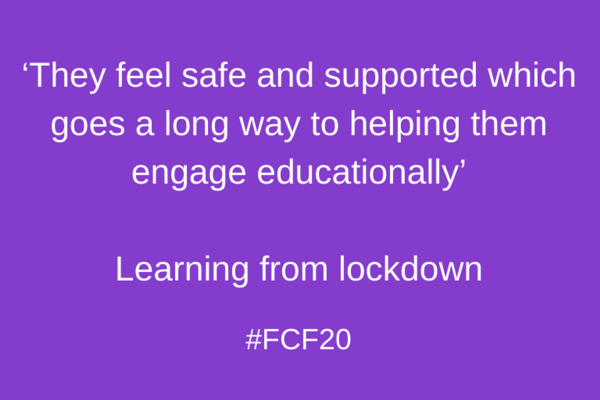In our work at the Anna Freud Centre with children living away from their birth families – in foster, adoptive and kinship placements – we have noticed some children finding lockdown something of a relief. It feels important to pay attention to the evidence we have that some children have really enjoyed and benefited from their world shrinking for a while. Let’s capture these reflections while we can, before events overtake us again.
Of course, this is by no means the experience of all fostered children. There are those for whom school is a generally positive experience and who find it gives them some sanctuary from the challenges of navigating caring relationships. For them, this extended period out of school will have been sorely missed. It is also important not to overlook the huge losses experienced during the pandemic, and the challenges involved in adapting lives around the restrictions. Many foster carers, like everyone else, have been impacted by job changes and losses, ill-health, and bereavement. Some children have felt more settled for a while, but then their needs have changed. In reality, a consistent experience has been lacking for us all over the past three months!
From discussions within our clinical team, a number of themes have emerged:
Attachment needs
Coronavirus arrived in our worlds in March. It brought with it significant fear and uncertainty. We were being asked to make changes in our lives that most of us had never had to make. Whenever a child is faced with fear and change, they turn to their primary carers to help them to return to a sense of safety. By listening to and connecting with their worries, giving them cuddles and extra care and tolerance, most children feel reassured and regain a sense that the world is not such a scary place.
For children who have experienced early trauma and loss, this extra attention and reassurance sometimes isn’t enough. They can’t turn off the alarm bells ringing inside their heads, they can’t quite believe that you are going to continue to be there for them in the ways that you say you are. For some children, the only thing that will convince them they are safe is staying physically close to their source of safety, seeing with their own eyes that you really remain available whenever they might need you. In this way, lockdown may have provided them with more of what they need than they would usually get. More cuddles, more mealtimes together, more playful connections, more family time. They may have felt more nurtured, providing a sense of increased security that can be maintained through their future development.
Away from school
One of the biggest challenges for children who have experienced early adversity – whose early relationships have not been safe and containing – is making and maintaining positive relationships. From the moment they step into a school day, they are expected to interact with multiple children and adults on many different levels. This is pretty exhausting for any child, but for those for whom relationships and social interactions are more difficult, this is a huge challenge. Some children also find that school can be triggering in many different ways and can lead to challenging or disruptive behaviour. This can elicit feelings of shame, of being disliked by peers and adults, and of self-loathing – all of which are hard to tolerate. For some, time away from these parts of themselves has been quite liberating.
Many of the children you look after will have additional needs, as identified by a diagnosis (such as ASD or ADHD) or what you learn about them as their carers and closest allies. They may get worked up when things are too noisy, forget to use the toilet and have accidents, be very hard on themselves and feel stupid in class. Even the experience of getting their shoes on and leaving the house can be really challenging (for everyone!), as many children in care find transitions particularly difficult. During lockdown, the absence of these rushed daily stressors, including the exits from home may have been quite welcome.
Of course, some children have been in school during lockdown and have experienced something quite different. For many of them, changes in school structures have made the experience more fun and less stressful. They have benefited from smaller groups of a range of ages and abilities, less academic pressure, and more adults available who have taken a more caring approach.
Changes to contact
For many fostered children, contact with birth family is a regular part of their lives. While staying in touch with siblings and parents can be hugely important, it can also be fraught with difficult feelings. Many children in care live with the constant fear of rejection. For others, seeing birth family brings up unresolved muddles about why they are in care and memories of when they lived at home. Foster carers might notice that children are unsettled or upset before and after contact, and need extra care and comfort. Despite best efforts, the physical environment can sometimes be less than ideal and contact supervision can cause self-consciousness, making children feel different and ashamed.
During lockdown, some family visits have gone ahead as usual. However, for many children, contact has been moved to an online forum with video chat, games and instant messaging. This seems to have had varied success. It is much harder for very young children to connect over a screen. But for others, changes to contact arrangements might also have brought some relief or been a more positive way of seeing family members.
So what can be learnt from this experience?
1. If there are aspects of lockdown that have been embraced and enjoyed by the children in your care, make a note of these and see what can be maintained as lockdown eases.
2. Children in foster care need a huge amount of time with their carers to maintain a feeling of safety and security. Look at how your daily and weekly routines could be arranged to make more space for time together.
3. Increasing numbers of families are approaching schools about reduced/flexible timetables. Other options might include the school providing a quiet space for your child to use during the day, or building on a relationship made during lockdown with a caring staff member.
4. Make more space for unstructured play and connections, for example by factoring in ‘downtime’ after school. Little changes you make might reduce a child’s sense of rushing and being rushed, of regular changes of scene and the social rules that come with them.
5. It may be that contact arrangements can be tweaked to fit your child’s needs better. Explore creative ways that connections can be maintained to meet everyone’s expectations, but which also attend to the feelings of stress, guilt, shame and uncertainty that face-to-face contact can elicit in a child.
A good starting point to all this will be to reflect with your child. Ask them what was easier and better during this time, and what has been more challenging. If they find it difficult to open up in conversation, try drawing pictures or even playing schools together as a way of thinking about these issues. Take time to reflect on what you learn before making any changes. Stay curious. If your child (and perhaps your whole family) has made gains during lockdown, now is the time to be thinking and talking about how to build on these gains.
Katherine Mautner is a Senior Clinician at the Anna Freud Centre, working in the Specialist Trauma and Maltreatment Services team ([email protected])








